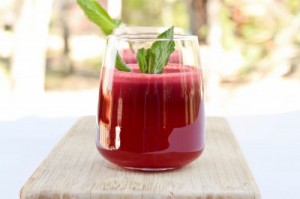Guest Writer for Wake Up World
Could beet juice help you exercise longer and more efficiently?
The health benefits of beet juice (also known as beetroot juice) have been appreciated for thousands of years, and beet juice was even a common remedy for the ancient Romans. However, studies conducted in the past few years have identified a new and exciting potential benefit of drinking beet juice: an increase in endurance.
Recent Research On Beet Juice
The first groundbreaking study that examined the impact of beet juice on endurance was performed by researchers at the University of Exeter in the United Kingdom in 2009. Simply put, researchers found that athletes who drank about 17 ounces of beet juice every day for six consecutive days could exercise for up to 16% longer than when they were given a placebo.
[pro_ad_display_adzone id=”110028″]
A further study by researchers at the University of Exeter confirmed its initial finding, with emphasis on consistency, allowing the body to become acclimated to regular beet juice intake. Other studies have found that beet juice consumption just hours or days prior to competition will likely have no effect on endurance.
How Might Beet Juice Increase Endurance?
Beet juice naturally contains high amounts of nitrates and antioxidants. In regards to endurance, these nitrates are converted to nitric oxide by the body, a compound that is able to enhance blood flow and lower blood pressure by widening and relaxing blood vessels. In turn, muscles are provided with more oxygen-rich blood and are able to function better. In theory, the beneficial nitrates in beet juice are thereby able to improve the body’s ability to exercise. Therefore, drinking beet juice is considered to be superior to eating cooked beets, as the cooking process can deteriorate some of the natural nitrates in beets.
Empirical Evidence Supports Beet Juice
Beet juice has already become a popular dietary supplement for many endurance athletes, and was widely used by athletes during the 2012 Summer Olympics. Many of these athletes have gone as far as to cite beet juice as a major contributing factor in their performances. As a completely natural solution, beet juice is regarded as a way of gaining a natural, legal advantage over the competition by many of its users.
Additional Benefits of Beet Juice
The ancient Romans used beet juice as a treatment for both fevers and constipation, and also considered it to be an aphrodisiac, which has since been scientifically supported. More recent research has shown beet juice can potentially reduce blood pressure, improve blood flow, act as a detoxifying agent in the blood and liver, and be a fabulous source for a variety of different nutrients.
Is Beet Juice for Everyone?
While beet juice may be particularly beneficial for endurance athletes, it’s generally beneficial for most everyone. Some people may enjoy greater benefits than others, and beet juice may not be appropriate for all people, especially pregnant women or those medicated for high blood pressure or heart problems. New and ongoing research is expected to reveal more information regarding the benefits of beet juice.
As always, consider and evaluate your unique health circumstances prior to beginning new treatments. Finally, if you decide to try beet juice but do not enjoy the taste, consider cutting it with the juices from some fruits, such as apples.
About the author:
Derek is a technical writer and editor with 10 years of experience in the health care field, having first earned a Bachelor of Arts in English from the University of Delaware. He is a contributing author on a number of textbooks in the medical field, ran a nuclear cardiology licensing course, and has written a variety of other pieces from online training courses to medical software manuals. Derek pursues his personal interest in health and wellness by playing multiple sports and running marathons. An insatiable traveler, he spent 16 months working and living abroad while traveling through South America, Europe, and Southeast Asia.
This article was republished with permission from Live in the Now, one of the fastest growing natural health newsletters. Visit LiveInTheNow.com to browse their complete library of articles, or join the nearly 60,000 readers subscribed to their Newsletter.
[pro_ad_display_adzone id=”110027″]







